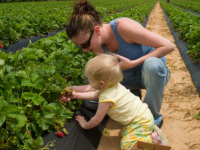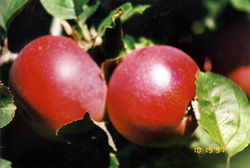 When I was younger, during harvest times our family would sometimes go to farmers where the mechanical harvesters or crews of pickers had been through and glean what was left. Sometimes there is a token fee, often they let us take what we could gratis. We got apples, cherries, broccoli, corn, tomatoes, berries and other produce. It was a welcome addition to the table.
When I was younger, during harvest times our family would sometimes go to farmers where the mechanical harvesters or crews of pickers had been through and glean what was left. Sometimes there is a token fee, often they let us take what we could gratis. We got apples, cherries, broccoli, corn, tomatoes, berries and other produce. It was a welcome addition to the table.
Gleaning is an old, old tradition. Provisions for it were built into those parts of ancient Israelite law that covered agricultural matters. The margins of each field were allocated for the poor to come and glean after the harvest. Fruit that fell by itself on the ground was given the gleaners.
Today there are many pressures on what’s left of the middle class and the growing ranks of the poor. I have maintained that local efforts to reshape the nature of our economy can do much to alleviate the continuing economic catastrophe. One that is happening in my home town of Salem, Oregon is a program that helps people obtain free food while helping others who face food insecurity.
 Salem Harvest (http://www.salemharvest.org) is an organization where farmers, commercial growers, or anyone with a fruit tree or vine can register their trees using the organizations web site. If they have produce they can’t harvest or that remains after the regular harvest, Salem Harvest will organize parties for families to come out and pick what’s left.
Salem Harvest (http://www.salemharvest.org) is an organization where farmers, commercial growers, or anyone with a fruit tree or vine can register their trees using the organizations web site. If they have produce they can’t harvest or that remains after the regular harvest, Salem Harvest will organize parties for families to come out and pick what’s left.
Now, here is the massively cool part of this setup. You go out and pick to your heart’s content. When you get ready to leave, Salem Harvest takes half of what you have picked to donate to food pantries associated with Marion-Polk Counties Food Share, and you take the rest home for free. If that sound like a lot to give up, trust me it isn’t. Even a 50-something like me could pick more in an hour than our family could ever use, even we canned or froze much of it. Besides, the prospect of being able to send a few dozen pounds of fresh food to people who really need it is incredibly empowering. You never know when you might be in such a state of need yourself. One picker I’m aware of spoke to the owner of a large orchard who said that each year 10 to 20 thousand pounds of fruit are wasted when they get left behind by commercial pickers.
The state of American communities has suffered a lot over the last few decades due to a lot of things I won’t go into here. But the practical effects have been a sense of isolation not just from each other but from how we live. Even fewer of us really understand where our food comes from, and often it comes shipped ridiculously long distances at obscene energy costs because it makes sense for some company to do it that way. There are more and more headlines proclaiming “the end of cheap food” but I beg to differ. Keeping it local, bringing ordinary people into the food process with gleaning programs, farmers market and raising awareness of our interdependence can forestall much of this, and in may other ways can only be good for us as a nation.

